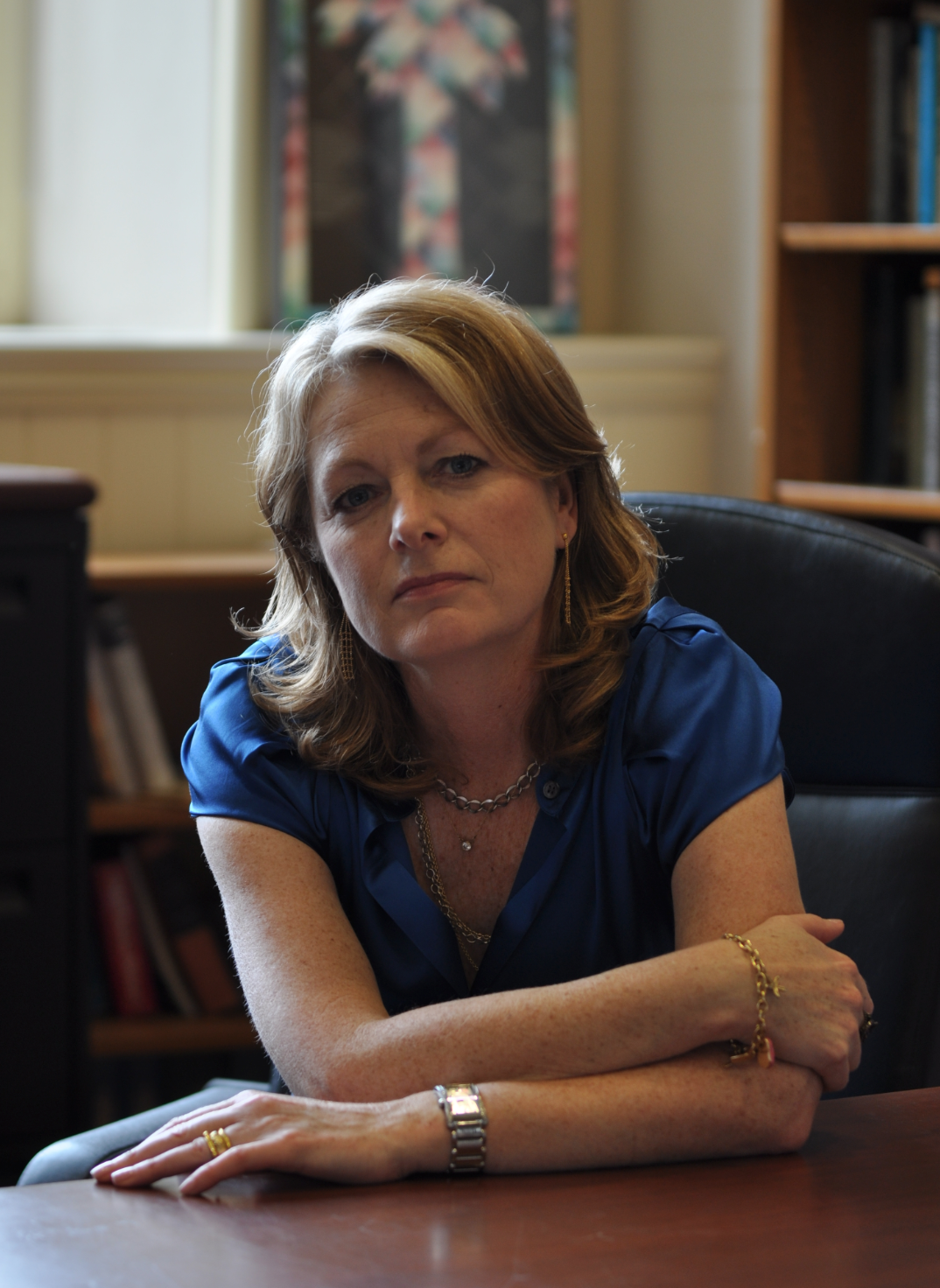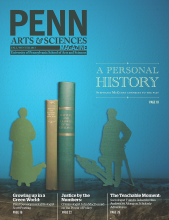How did a native of Northern Ireland become a scholar of the 19th-century American South? For Christopher H. Browne Distinguished Professor of History Stephanie McCurry, the connection she felt to the period and place was instinctive: “Something profoundly touched me.” Through her teaching and writing, she wants to help others find that same immediate connection to something—or some time—they might never have dreamed would interest them.
McCurry grew up in Belfast, “in the middle of a military occupation and what many would call a terrorist movement.” As a teenager she moved to Toronto and a different world, carrying intellectual aspirations she couldn’t name and political observations with no outlet. The first in her family to attend college, she took a required course in American history and lucked into a great professor and the Civil War.
“I didn’t know it, but it was a movement of a set of concerns about ethics and power and violence and legitimacy from one historical area to another,” she says. She was able to focus her questions and theories on a topic that held similar quandaries, but at a remove she could not get from Irish history.
“I was just completely blown away by what I saw as the ethical problem of American history,” says McCurry. Thomas Jefferson, author of the Declaration of Independence, owned slaves: “How could both of these things be true? The U.S. is the world’s leading democracy. It creates and exports the concept of self-government. The Civil War is the test of self-government: Can this republic survive or not?”
McCurry’s interest in social history was facilitated by her own era; when she was in college and graduate school it was a new approach, tied to the many democratic movements that characterized the ’60s and ’70s. “We didn’t care what the kings did, what was everybody else doing?” she says. She and her peers were looking at history from the bottom up, with a lot of room to do work requiring new methods and sources.
While the history of slavery was one of the seeds of the movement, McCurry feels that women’s history was kept very separate, “almost ghettoized” in the ’70s and early ’80s. “It never seemed to have to do with the big political story of revolutions and civil wars and empires. It does now, but it took my generation of feminist historians to really figure out how to do that.” She is concerned now that women’s history as an integrated study is again losing popularity.
"The Civil War is the test of self-government: Can this republic survive or not?”
Her own work integrates everything: women, war, plantations, slavery and slaves’ experiences, and the smaller parts of society often left out of histories. Her first book was Masters of Small Worlds: Yeoman Households and the Political Culture of the Antebellum South Carolina Low Country, about the farmers whose properties were dwarfed by the large plantations but who still wielded political power as white property owners. In her second, Confederate Reckoning: Power and Politics in the Civil War South, she described how the women and slaves who were marginalized by the Confederacy helped to bring it down.
McCurry’s never really thought of herself as a Civil War historian, a title that signals military history. “That’s a particular lockbox to get into,” she says. “For me, the whole set of questions that I’m interested in circulate around questions of power and its uses in human history.”
She has found, however, that the enormous interest in the Civil War has led to opportunities for her to write for popular publications—unusual for an academic: “I can’t think of many fields where you have these built-in bridges to a popular audience.” She writes a bimonthly column, “Her War,” for the magazine America’s Civil War, relishing the chance to take her scholarly research and distill it into a narrative story—one of special interest to women.
The same desire to reach an audience drives her work as a teacher. McCurry was on the faculties of the University of California, San Diego (UCSD) and Northwestern University before coming to Penn. In addition, she has served as director of the California History Project (a K-12 initiative) and as undergraduate chair in the history department at Penn. She does a one-week Civil War seminar each year for the Gilder Lehrman Institute of American History for K-12 instructors.
Of teaching at Penn, she says, “I think students are often shocked that history as we teach it is as interesting to them as it is.” McCurry labels textbooks the kiss of death, and describes Advanced Placement history as “swallow the textbook—it’s just one thing after another.” Her antidote is to link the specific history of the problem with something that touches the human condition. “And that’s not hard. And if you teach with that mentality, students are more likely to understand the stakes.”
History is intrinsically interesting, she believes, but faculty have to think as hard about their teaching as they think about their writing. “Just out of graduate school, it is easy to underestimate how much work is involved in writing good lectures. It isn’t a charisma exercise.” She taught her own first class as an assistant professor at UCSD. “I was 29, there were 350 students and seven teaching assistants,” she says. “You learn how to teach to save your life in those circumstances. There’s a learning curve. You have to find your own style.”
Now McCurry teaches undergraduate classes, graduate seminars, public lectures, and students who “are computer scientists and, God bless them, are paying for this course and coming at night after work.” Next semester, however, she’s again taking herself out of her comfort zone. Through Coursera, Penn’s global partner for massive open online courses (MOOCs), she will teach History of the Slave South to thousands of students online around the world. “I felt I needed an intellectual challenge,” she says. “I wanted to try something new and be part of a larger conversation. Coursera seemed one way to do that.”
McCurry also believes that, although the online class is separate from her responsibilities in the history department, the department and its graduate students need someone to have this experience and knowledge. Very few historians anywhere have taught MOOCs before. “Online teaching is here,” she says. “I wanted to figure out how to do it and what parts of it work and what don’t.”
For Coursera, McCurry is prerecording her lectures, which her students will then watch, taking quizzes to help track their progress. “It’s a very different thing than I’ve ever done before,” she says. “It’s still unclear to me how my energy and passion and personality and ability as a teacher will be conveyed in this forum. It’s challenging to me in a way that is still very sobering.”
“I think the world is a far more interesting place to be in and live through if you have some sense of where things came from."
Though she feels that some aspects of her “in person” class at Penn won’t ever be available through an online format, she is already seeing a productive carryover from the experience. “It’s shaking things up in the way I had hoped it would. But it will be a demanding semester.”
Online or in class, her goal remains to make a connection between her field and her students. “There are people where you touch something, and they have to figure out what it means for them. It’s a very ineffable thing, but I still think it’s what we’re here for,” she says.
“I think the world is a far more interesting place to be in and live through if you have some sense of where things came from,” says McCurry. “You can’t just cut into a problem in the present and understand it. You would feel adrift. People set themselves up for a far more interesting life if they have some sense of how we got here.”
THE FUTURE OF HISTORY
“They come to us for an elective, and then they stay,” says Stephanie McCurry about Penn undergraduates who decide to major in history. “But it takes more and more creative strategies to make the value of education and knowledge apparent, and also just to be open to new media like Coursera.”
When McCurry became the Department of History’s undergraduate chair, a post she held from 2009 to 2012, the number of history majors was dropping at Penn and across the country. The same was true for many other humanities disciplines. She believes a general trend toward business-oriented commercial education was greatly heightened by the financial crisis and recession.
McCurry and the other faculty reworked the curriculum. They added a new world history survey focusing on transnational approaches to history. Because a historian’s expertise is usually location-based, professors co-teach. They’re also holding seminars on topics of interest; right now, the history of capitalism is hot.
Some of it is marketing, but McCurry knows there is an audience for history and the humanities. “You let kids go to college, you don’t know what they’re going to find interesting. Our majors, many of them do wind up on Wall Street, and they’re very good at it. They can write. They can reason. They can think. They can make a case,” she says.
“Conan O’Brien’s a history major,” she points out. “Intelligent, astute, observant, funny people—that’s what we turn out.”






